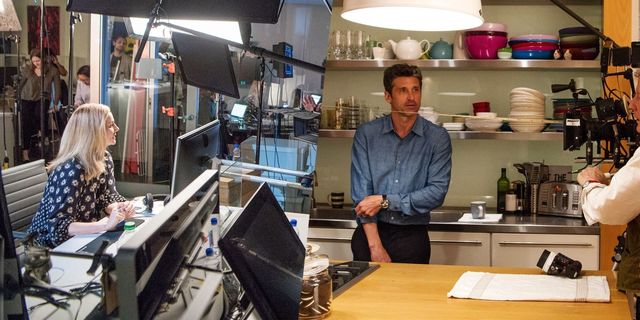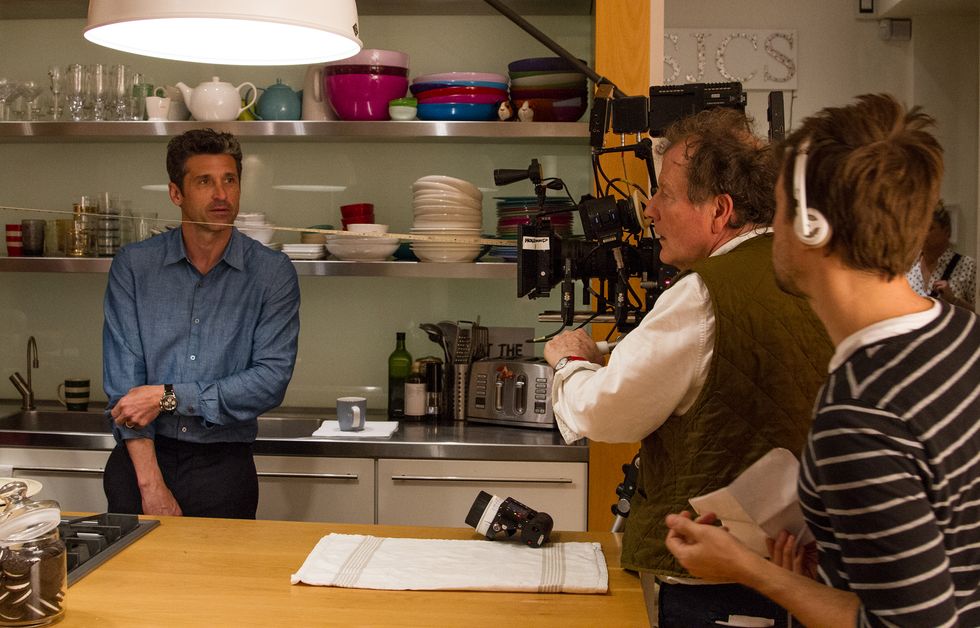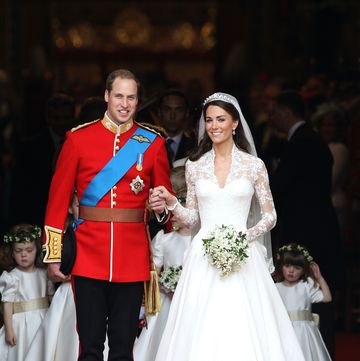"It's like watching Ophelia come back to life!" Richard Curtis is joking; there's nothing particularly Shakespearean about the scene he's currently shooting for Red Nose Day Actually, in which Laura Linney's earnest, sweet-natured Sarah works late, takes a phone call, and trades some flirtatious banter with an initially-mysterious person. But the comparison is strangely apt, because Sarah is the closest thing that Curtis's festive rom-com classic Love Actually has to a tragic heroine. In the movie's patchwork of loosely-connected, bittersweet-but-ultimately-triumphant love stories, Sarah is the outlier. Having spent months pining for her ludicrously attractive colleague Karl (Rodrigo Santoro), Sarah finally gets to hit that—only to be interrupted pre-coitus by a call from her mentally ill brother, who needs her. He always needs her, and she always goes to him, and so her romance with Karl withers on the vine. As Linney puts it, "She doesn't get to go to the airport. She was the only one it didn't happen for."
It's not the fact that Sarah ends up single that stings; it's the fact that she's allowed caring for her brother to consume her, to the point where she can't put her own desires first, for even a single evening. If she's not quite Ophelia drowning, she's at least the character whose fate most tempers Love Actually's happy ending. Curtis, catching up with me before shooting Linney's new scene in a sleek Manhattan office building, says over the years he's encountered many people who "worry about Sarah. I was keen to revisit her for that reason."
Red Nose Day Actually is not a fully-fledged sequel, but a short which reunites most of the original cast in aid of the UK-based charity Comic Relief, and its Red Nose Day campaign raising money for children in need. The film has already aired in the UK, but will air in the U.S. next Thursday, May 25 with the additional bonus of Linney's participation; she's shooting her scene in a single evening, slotted in around her schedule on the Broadway play The Little Foxes. Though the sustained interest around the movie came as a surprise to some, it didn't to Linney. "Love Actually has such an authentic kindness and sweetness to it, and we live in a world where that is not appreciated or experienced a lot of the time," she says. "I think that's why the movie, much to many people's surprise, has had such longevity, and seems to gain steam every year."
I'm at liberty to reveal almost nothing about the actual content of Linney's scene, except that it is delightful and involves Patrick Dempsey. Suffice it to say, there's plenty for die-hard fans to enjoy. Like most of Red Nose Day Actually, the scene is a deliberate mirror of one from the original movie, and even a shot-for-shot replication in certain spots. Despite 15 years passing since the shooting of Love Actually, Curtis says there was no dissonance with the actors reprising their roles. "There's a strange thing where if you've got the original casting right, the soul of the people stays the same—we cast Keira [Knightley] as a young girl, and all these years on she's still so sweet and perky. Andrew Lincoln was the nicest guy you've ever met when he was 25, and he's still depressingly nice now. And Hugh [Grant], of course, has always been a monster, and remains a monster. Everybody's retained their core values!"
Once Lincoln's name comes up, I'm duty-bound to ask Curtis's opinion on the still-simmering controversy surrounding his character. Is Lincoln's lovelorn Mark—who spent his best friend's wedding day obsessively filming the bride from afar before declaring his love for her via a series of placards—a lovelorn nice guy, or a borderline stalker? "It's interesting that people have found the scene problematical," Curtis says, "and on reflection, I do think it was probably slightly strange behavior! But I think he was just naïve, and trying to get closure on how he had always felt."
But the sequel is far from a perfect mirror image of its predecessor due to the glaring absence of Alan Rickman, who died last January. Emma Thompson, who played his on-screen wife in what might be the only Love Actually storyline more heartbreaking than Sarah's, mutually decided with Curtis that it would be too sad, and too soon, for her to return. "Alan was really one of the greats, and a tremendous advocate for young actors," Linney says quietly. "He was just generous beyond what you think anyone is capable of. He was one of my favorite people on the planet."
Much like every other conversation you've had in the year 2017, talk on set eventually led to the subject of Trump's America, and to what place a relentlessly un-cynical movie like Love Actually has in a world this chaotic and corrupted. "Maybe that's what Trump needs," Linney notes drily. "A little Love Actually in his life. Maybe that's the answer." The movie's glorious press conference scene, in which Hugh Grant's British prime minister responds to a journalist's question by giving Billy Bob Thornton's U.S. president a thoroughly deserved dressing-down, feels like a time capsule from more innocent political times.
Curtis was so conscious of the shift in political tone that he made it the focus of Grant's scene in Red Nose Day Actually; a new press conference in which the same journalist asks him whether he's as hopeful now as he was fourteen years ago. "Still, every day, people do extraordinary things for people they don't know, and most people have enough love in their hearts to help," Curtis says, echoing the answer he wrote for Grant. "Look at the knife attack in Westminster, which happened two days before [Red Nose Day Actually aired in the UK]. There are always heroes who rush to people's aid. I'm as optimistic as ever I was about the power of individuals to demonstrate love, both privately and publicly."
Now that this Comic Relief blueprint exists, would Curtis consider a follow-up to any of his other iconic Brit-coms? "I've always loved the idea of doing a film called Four Funerals And A Wedding," he muses, after the evening's shooting has wrapped. "I've always thought it would be a bit gloomy, but maybe twenty years from now…".














